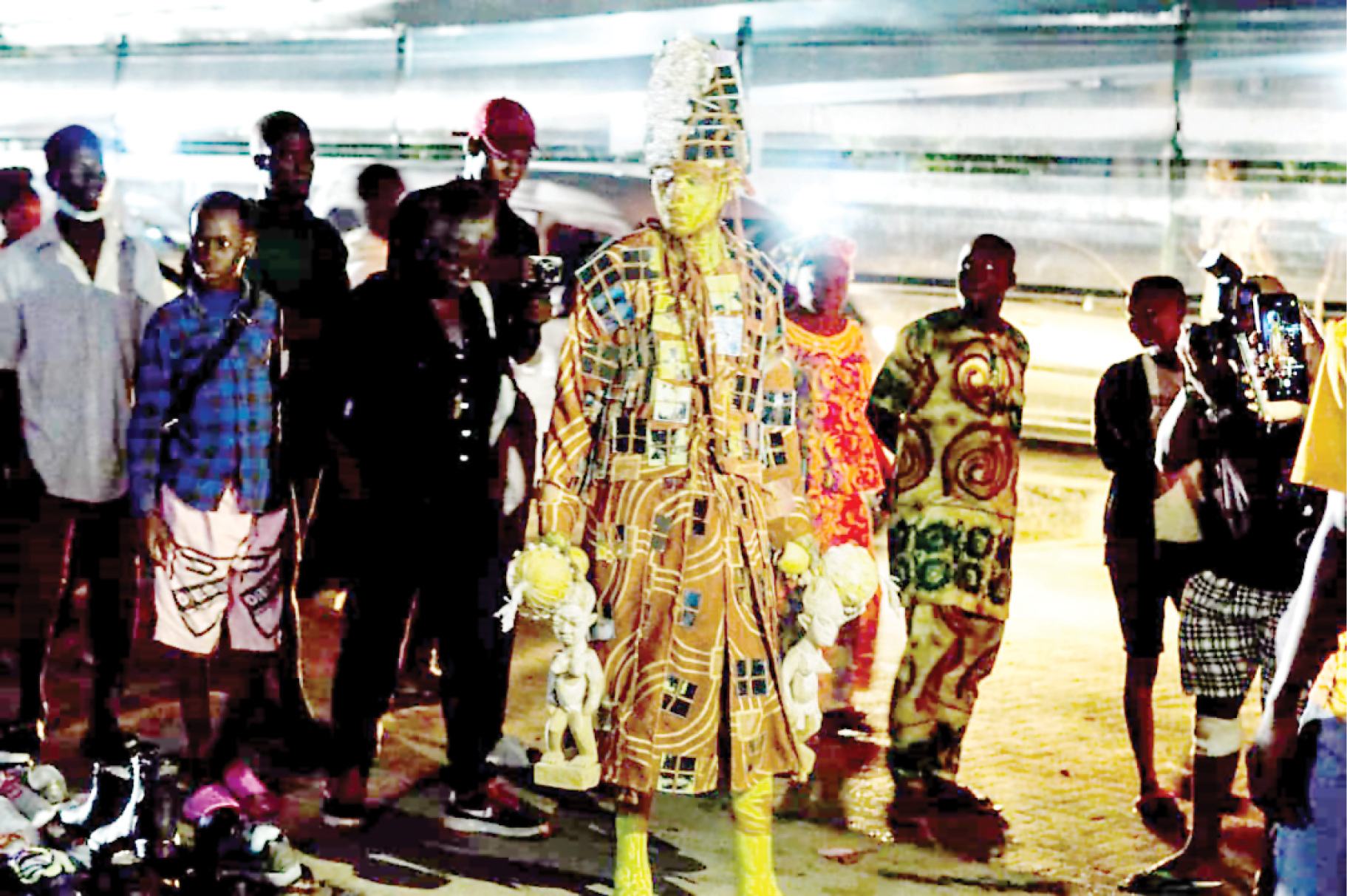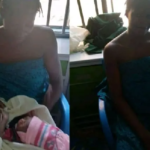ON Wednesday, June 9, it rained cats and dogs in Lagos, but the heavy downpour couldn’t cow creativity. It refused to succumb to the element and expressed itself fully and gloriously.
Storyteller, curator/ cultural producer, and the creative director of Revolving Art Incubator, Jumoke Sanwo, had chosen the date well ahead of time. The artist, who works primarily with photography, film, video art, and extended reality (XR), had chosen it for ‘Dúna Dúrà’ (The Negotiation), a site-specific performance. ‘Dúna Dúrà’ is one of six regional projects under Goethe Institut’s ‘Archive of Forgetfulness’. It’s a continental project that engages the interdependencies between spatial and embodied cultural memory.
The chosen venue was Ijeh Street, Obalende. It was going to be a night performance featuring the inimitable performance artist, Jelili Atiku. Sanwo, whose work engages the realities and complexities of spatiality and temporality in postcolonial societies, had done all her preparations but had not reckoned with the heavy rain. But much as it fell, it couldn’t stop the event from happening. While it continued to drizzle in other parts of the city well past the scheduled 7 pm, it stopped raining in Obalende and environs before the commencement.
The second part is the online exhibition in response to an open call. A nine-person selection committee comprising Ali Al Adawy (Egypt), Bongani Kona (Zimbabwe/South Africa), Eric Ngangare (Rwanda), Tayob (South Africa) and Sanwo worked on the entries. The others were Omnia Shawkat (Sudan), Princess Mhlongo (South Africa), Zakiyyah Haffejee (South Africa) and Zoubida Mseffer (Morocco).
The third part, which will unfold over 2021, includes six additional projects developed by the regional curators, Al Adawy, Kona, Ngangare, Tayob, Sanwo, Shawkat, Mhlongo, Haffejee and Mseffer.
Expounding on the significance of ‘Archive of Forgetfulness’, the Goethe Institut said it holds together acts of remembering: collecting and gathering stories often untold. “The contributions renew lines of connections, resurface forgotten conversations, and establish the beginnings of future collaborations. This project is a space for interrogating the archival gesture, from the bodily and spoken to the written and performed.
“Beginning with our interest in the entangled histories of how we live our lives, the project is framed by a series of questions: We ask what personal and political histories emerge via infrastructures? We question how thinking through deep and recent histories, across water or through the skies, might reveal alternative ways of living? And how dreams of freedom and other worlds that might have been possible haunt our present and suggest other possible futures?”
So, despite fears that the rain could cause the show’s cancellation, Sanwo, whose practice is informed mainly by ‘global localization’ or ‘glocal’ with a local approach to engagement and storytelling, pulled it off.
‘Dúna Dúrà’ interrogates spatial and embodied memory through a site-specific cultural co-production, drawing from Atiku’s practice of investigating psychosocial phenomenology through performance. ‘Ẹ̀mí, Ọlọ́ọjà Ara’ (soul, the marketer of the body), situates the human soul as a negotiator within acts of remembrance and forgetting. The performance, which halted activities at Obalende that evening as people converged to watch, was also streamed to a virtual audience via YouTube and Instagram Live.
It started with Aremo Gemini’s spoken word performance ‘Messages from Ejigbede’- an ancestral traveller in between earth, heaven and the afterlife of potsherds. After this, Obasola Bamigbola led a series of virtual and on-site interviews.
Interviewees included Prof Moyo Okediji (We Don’t Die-The Archive is Embodied); Stephen Ajadi (The Architecture of the Night market); Dr Taibat Lawanson (Urban informality -The night market) and Adeboye Martins (The Place Where the King Chased us to). The others were Oludamola Adebowale (The Night Market and History); Dr Adun Okupe (AyéLojà, OjàL’ayé); Sola Akintunde (Architecture of the Night Market II); Wale Egbeyemi (Baba Oja)- AyéLojà, OjàL’ayé and Adenike Egbeyemi.
The evening’s finale was Atiku’s performance, ‘Ẹ̀mí, Ọlọ́ọjà Ara’ which situated the human soul as a negotiator within acts of remembrance and forgetting. The performance explored the interstitial nature of memory, drawing from acts of negotiation within the market space and the traditional role of the night market as a portal between the corporeal and incorporeal world.
“Within the context of a re-imagination, we reflected on embodied archives as spaces of re-experiencing and producing absences, through acts, objects, places and spaces; where a place is associated with the world of the past, and space with the world of the present and future,” Sanwo explained after it ended.
The widely exhibited artist added: “Negotiators within acts of re-imagination became a resource of alternate thinking, the interlocutor of ‘unstructured’ spaces, and knowledge; serving as portals into rethinking of archives of the future; one which reflects the societies’ agreed customs, expressions, memory, and identity, within which the future is always present in the now.”
YOU SHOULD NOT MISS THESE HEADLINES FROM NIGERIAN TRIBUNE
We Have Not Had Water Supply In Months ― Abeokuta Residents
In spite of the huge investment in the water sector by the government and international organisations, water scarcity has grown to become a perennial nightmare for residents of Abeokuta, the Ogun State capital. This report x-rays the lives and experiences of residents in getting clean, potable and affordable water amidst the surge of COVID-19 cases in the state.







